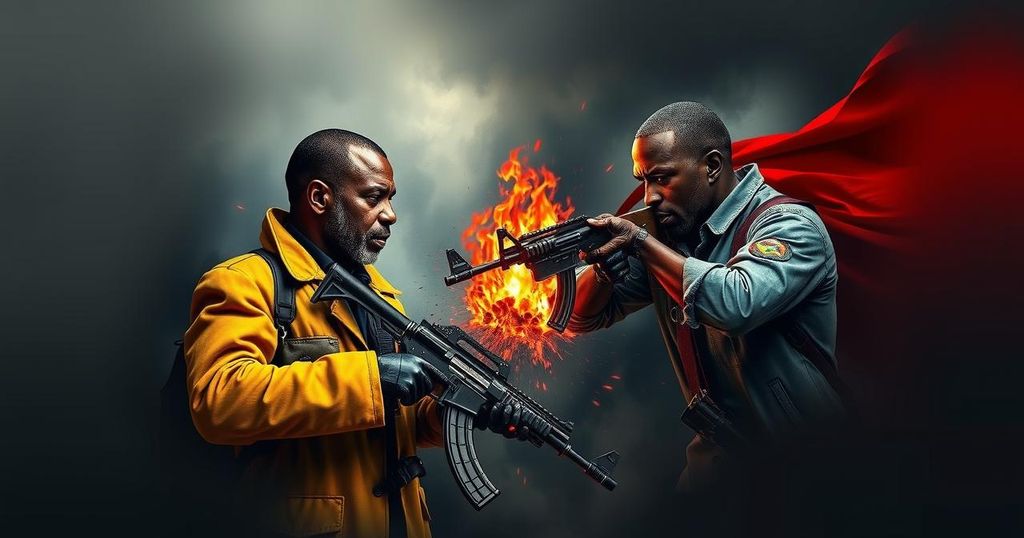The Angolan government has expressed alarm over renewed violence in eastern DRC, which undermines recent ceasefire efforts. Angola’s mediation has aimed to resolve tensions between the DRC and Rwanda amidst accusations of rebel support. Clashes this past weekend have raised serious concerns regarding the sustainability of peace initiatives, with a growing humanitarian crisis affecting millions of displaced civilians.
Recent escalations in violence in eastern Democratic Republic of the Congo (DRC) have caused significant alarm within the Angolan government, which had been actively pursuing a long-term ceasefire following a month-long lull in hostilities. In a statement released on Tuesday, Luanda emphasized that the resurgence of violence constitutes a blatant breach of prior agreements made at the ministerial meeting on July 30 and undermines the agreed ceasefire that was to become effective at midnight on August 4. Angola has taken on a mediating role in the ongoing tensions between the DRC and Rwanda, both of which have accused each other of supporting rebel factions threatening their national stability. The two nations had convened just two weeks prior in Luanda, where they expressed commitment to diplomatic resolutions. Notably, Kinshasa (the capital of the DRC) had assured that the FDLR rebels, perceived as a threat by Rwanda, would not receive support from the Congolese army, contingent on Rwanda ceasing its support for the M23 military group. In reaction to the renewed conflict, Angola has clearly denounced these violent acts, which it perceives as detrimental to the ongoing peace efforts in eastern DRC, calling all involved parties to honor the ceasefire reiterated in a ministerial meeting on September 14. Reports indicated clashes over the weekend near the village of Kalembe, where the Congolese army clashed with the M23 rebel group, resulting in the army reportedly regaining control of the area. Former MP Juvenal Munubo noted, “I have learnt that the NDC Rénové (Kivu armed group), with logistical support from the Fardc, has regained control of the town of Kalembe. I call on the Fardc and the patriotic resistance fighters to consolidate this victory.” MP Willy Mishiki further remarked on the rebels’ intentions to extend control over additional provinces, namely South Kivu, Tshopo, and Maniema, emphasizing the gravity of the situation. An absence of response from Congolese officials regarding the truce violations raises significant concerns, prompting Munubo to question, “What about the ceasefire agreed in Luanda?” Despite the ceasefire established in early August showing some promise, allowing a number of displaced individuals to cautiously return to their homes, ongoing political tensions remain. DRC officials have ruled out any negotiations with the M23, whilst discussions between the DRC and Rwanda are active. During the latest round of talks on October 12, foreign ministers from both countries agreed on the need to address remaining security issues concerning the drafted peace agreement facilitated by Angola. Luanda has advised against actions that might exacerbate the already dire humanitarian situation in eastern DRC and reinforced its resolution to facilitate a lasting solution through the Luanda Process, which is overseen by President João Lourenço and includes African Union participation. To this end, Kigali and Kinshasa have committed to establishing an ad hoc verification mechanism aimed at monitoring the peace progress, which is expected to launch in Goma by November 5, 2024, according to the communiqué from their recent meeting. The Office of the United Nations High Commissioner for Human Rights has reported that over 14 civilians were injured in the recent conflicts, with over 940,000 people projected to be displaced in 2024 alone, leading to an alarming total nearing seven million displaced persons across the DRC. This ongoing conflict exacerbates humanitarian crises, particularly in North Kivu, where civilians are faced with severe overcrowding and threats of violence including sexual assault.
The Democratic Republic of the Congo has been embroiled in various conflicts for decades, primarily due to the complex interplay of ethnic tensions, resource exploitation, and political instability. The region of eastern DRC, particularly, has been a hotspot for violence involving numerous armed groups, often spilling over into neighboring countries. The international community has urged dialogue and peace accords, resulting in efforts led by Angola to mediate between the DRC and Rwanda, both of which accuse the other of fomenting unrest through support for rebel groups. Recent developments saw a ceasefire put in place, although recent breaches have raised concerns about the sustainability of peace in the region and the humanitarian ramifications for millions affected by the conflict.
In summary, the resurgence of violence in eastern DRC poses a significant threat to ongoing peace efforts previously established through a ceasefire and mediation by Angola. The latest clashes reveal deep-seated tensions between the Congolese army and M23 rebels, drawing international attention to the fragile humanitarian situation. The commitment from both DRC and Rwanda to address these issues underscores the urgency for establishing a durable peace, though considerable challenges remain ahead. The humanitarian crisis continues to escalate, leading to an unprecedented number of displaced persons in the region, requiring immediate and concerted international response.
Original Source: www.theeastafrican.co.ke






